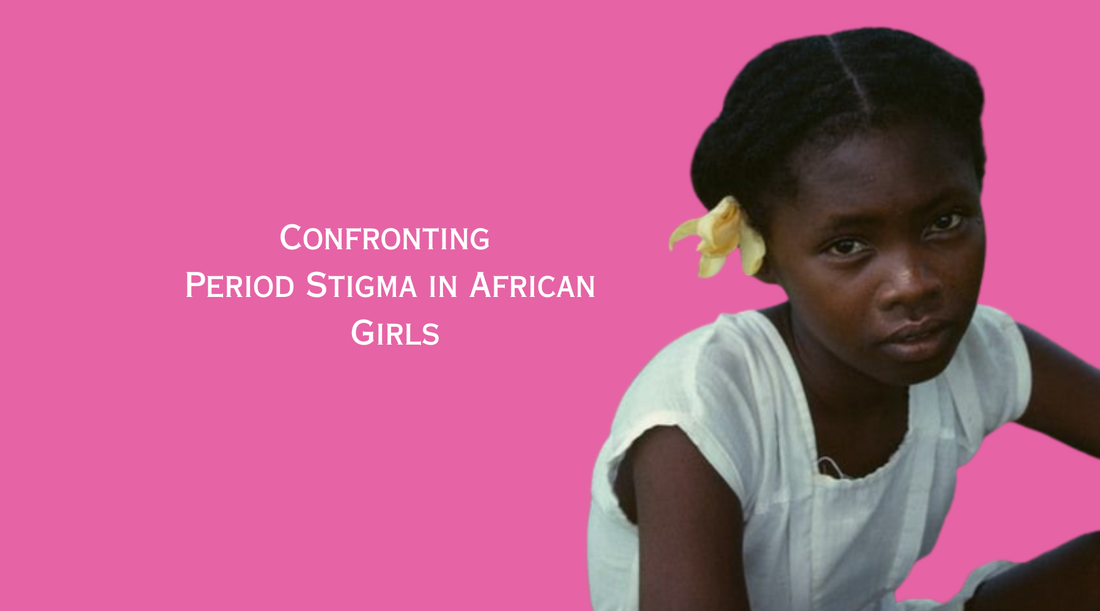As I grew up in a conservative Nigerian home, discussions centered around women's reproductive health were strongly discouraged. Anything related to menstruation and sex education had to be kept hush-hush and concealed from open conversation.
I can still vividly recall my first period, a moment filled with fear and heartbreak. I will never forget the overwhelming shame that brought me to tears.
Having witnessed numerous horrifying stories of how young girls were mistreated in my boarding school simply because they were on their periods, I was determined not to be subjected to the same treatment.

Periods are still a taboo in certain communities. Girls are discouraged from talking about it
The mockery was nothing short of repulsive, whether it involved noticing a small blood stain on a menstruating girl's pinafore or bedsheet. It seemed like a formidable ritual; the other girls would unite to keep their distance from her - the one who was on her period. I can recall that one instance where a menstruating girl was deliberately avoided during lunch and dinner times.
I remember feeling deeply hurt when a senior, whom I admired as my role model, insinuated that having a period was a sign of immorality and impurity. Her words made me feel guilty for something as natural as menstruation, as if I were engaging in a sinful act.
Throughout my teenage years, my perception of periods remained negative and filled with shame. Each passing menstrual cycle only reinforced the feeling of being unclean and dirty, adding to the burden I carried.
Fast forward to becoming an adult woman at the University and not much had changed. Both men and women still held stigmatising beliefs, and this prompted me to start questioning period stigma from a different perspective. The persistent misconceptions and prejudices surrounding menstruation urged me to explore the issue more deeply.
In my quest for finding answers, the very first thing that I found out and still intrigues till today is that period stigma is something well experienced by black women across Africa.
In Senegal, menstruating women are usually forced to isolate themselves and banned from certain household activities like cooking. This is because it's believed that menstruating women are dirty and impure. Such cultural norms contribute to period stigma and can have a serious negative impact the wellbeing and self-esteem of menstruating women.
And in Uganda, young girls stay away from school when menstruating to avoid being teased by their classmates. This unfortunate practise results from the pervasive period stigma in society, which for young girls makes menstruation a source of shame and embarrassment. Many girls miss out on important educational opportunities as a result, and they also encounter obstacles to their personal growth.
In Niger, there are superstitions that when a menstruating woman touches sowing seeds, it would lead to inadequate yields and that a menstruating woman must not braid her sister's hair as doing so would lead to hair loss.

Black African girls skip school when on their periods to avoid being ridiculed by their peers
In Congo, particularly eastern Congo, a menstruating girl does not go to the communal water pump or the communal toilets and does not prepare food. According to the Congolese tradition a woman who is menstruating is impure, and should be kept at bay as she contaminates water or a meal.
The more I discovered these stigmas, the more it felt wrong for them to exist. Even though I continued to explore period stigma experienced by black girl in African communities, I realised it was a global phenomena sitting within social development and cultural issues.
Fortunately for me, I pursued a major in Biological Sciences at the university, and it was in one of Ms. Aisha class where I finally found the answer to demystify periods. She explained that periods occur because the hormones in our bodies prepare us for pregnancy every month, forming a lining around our uterus to provide a place for a fertilised egg to attach itself. This lining falls off when there isn't a fertilised egg, which causes the bleeding we experience during menstruation.
Understanding the molecular mechanism underlying periods enabled me to challenge my long-held misconceptions about menstruation and view it in a completely new light.
So you mean to say I'm not menstruating cause I was cursed? What a shocker!

Black African women are starting to go against the status quo and speaking against period stigma
It made no sense to continue hating on this very healthy biological process. The knowledge I gained completely changed my behaviour towards period. I, in turn educated my younger brothers on periods, who now no longer feel embarrassed to help me get period products from the drugstore.
I no longer use euphemisms when trying to tell someone I'm on my period and I confidently speak about it because there's nothing about menstrual health and hygiene to be ashamed of.
Finally, an emphasis on education is necessary to reduce the stigma associated with periods in the black African community. This stigma is maintained by the absence of information on women's reproductive health. It is imperative that we raise our voices against period-shaming and actively encourage black African women and girls to engage in open discussions about menstruation. Empowering them with knowledge and understanding will open the door for a society that is more informed and inclusive.
Sources:
Unicef.org: Menstruation is a natural fact of life
Huck Mag: How Women in Congo are beating Period Stigma
Relief Web: Menstrual Health Management in East and Southern Africa: A Review Paper

